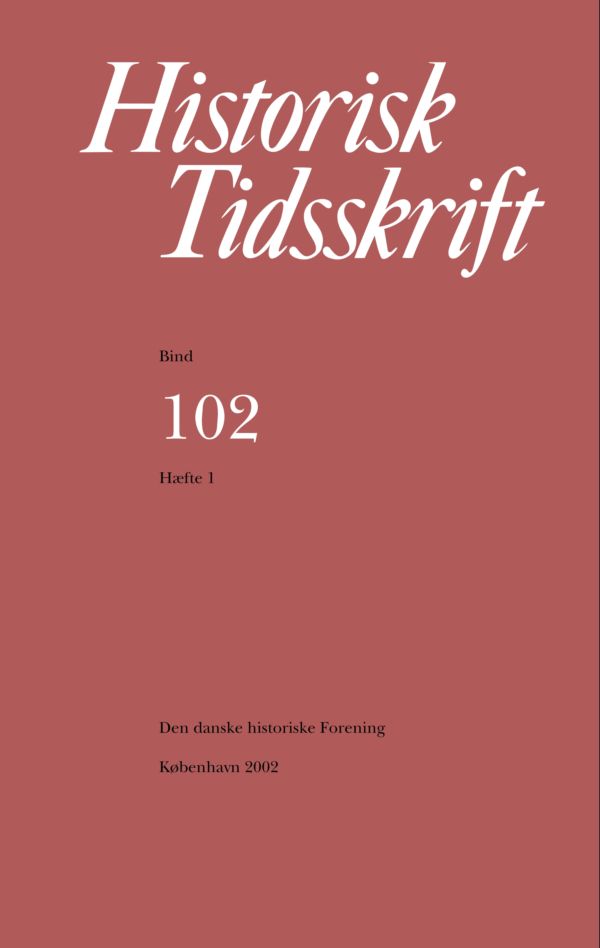The secret intelligence from Tilsit. New light on the events surrounding the British bombardment of Copenhagen in 1807
Resumé
The secret intelligence from Tilsit. New light on the events surrounding the British bombardment of Copenhagen in 1807'The secret intelligence from Tilsit' has been the subject of intermittent historical discussion for almost 200 years. The term refers to the information that reached George Canning, the British foreign secretary, in the early hours of 22 July 1807 from a confidential source. This information was highly alarming from a British perspective: it suggested that Alexander I of Russia and Napoleon had discussed the possible formation of a maritime league against Britain during their early meetings at Tilsit and that Denmark, Portugal and Sweden were to be forced to join this league.This article begins by examining the historiography of the secret intelligence from Tilsit - the various speculations about its source and the ultimate revelation in the 1970s that it was contained in a letter to Canning, dated 21 July 1807, from the comte d'Antraigues, a French royalist émigré resident in London at that time. D'Antraigues's letter claimed that his information came from a Russian general who held a position close to Emperor Alexander.This is the cumulative outcome of previous historical research. What this article seeks to add is the identification of d'Antraigues's alleged informant as Prince Vassili Troubetzkoi, one of Alexander I's aides-de-camp at the time of Tilsit, and an analysis of reliability of the secret intelligence.The historiographical section is therefore followed by some details about d'Antraigues and Troubetzkoi and the relationship between them. D'Antraigues's letter to Canning is then printed both in the original French and in English translation, and Troubetzkoi is identified as d'Antraigues's alleged informant on the basis of evidence drawn from a wide range of different sources.Finally, the article moves on to discuss the reliability of the secret intelligence from Tilsit. Did d'Antraigues receive a letter from Troubetzkoi at all or did he invent it? And, in particular, how much credence should be given to the assertion that Alexander and Napoleon discussed the formation of a maritime league directed against Britain at Tilsit?A close analysis of the text of d'Antraigues's letter to Canning reveals that it is riddled with inaccuracies and suggests that it was written largely in order to secure for d'Antraigues a permanent refuge in Britain and an increased pension from the British government. However, d'Antraigues's letter contains several pieces of information that were not common knowledge when it was written. This makes it more likely than not that there was some kind of communication from Troubetzkoi, however much d'Antraigues embellished and embroidered its contents when writing to Canning.As for the claim that the creation of a maritime league against Britain was discussed at Tilsit, there is no confirmation in French and Russian sources of this assertion. The various treaties concluded between France and Russia at Tilsit are, however, hostile in letter and spirit towards British naval and commercial supremacy. It cannot therefore be excluded that some words concerning an anti-British maritime league passed between the two emperors at Tilsit without being committed to writing.The overall conclusion of the article is that Troubetzkoi was d'Antraigues's alleged informant and probably did send some sort of communication to d'Antraigues from Tilsit but that d'Antraigues's letter to Canning of 21 July 1807 contains too many inaccuracies to possess much value as a source for what happened at Tilsit.When the British government was heavily criticised by the opposition in parliament during the early part of 1808 for its attack on Denmark the previous year, Canning referred to the secret intelligence from Tilsit in order to justify the seizure of the Danish fleet. This does not, of course, prove that the secret intelligence was in reality a factor in the government's decision to act against Denmark. The question of what influence, if any, d'Antraigues's letter to Canning exerted on that decision is one that the author of the present article proposes to discuss in future publications.Downloads
Publiceret
Citation/Eksport
Nummer
Sektion
Licens
Ophavsret til bidrag i Historisk Tidsskrift tilhører forfatterne og Den danske historiske Forening som udgiver af Historisk Tidsskrift. For illustrationer gælder den ophavsret, som står anført i billedteksten. Ophavsretslovens almindelige bestemmelser gælder, hvilket vil sige, at ophavsretten gælder i 70 år efter forfatterens død. Bidrag i Historisk Tidsskrift må derfor, med forbehold for en ”moving wall” på tre år, frit downloades, læses, gemmes, anvendes og citeres (med kildeangivelse) i privat og videnskabelig sammenhæng, men de må ikke helt eller delvis genudgives af tredjepart, heller ikke i redigeret form, uden tilladelse fra forfatterne og Den danske historiske Forening. Henvendelse skal i så fald rettes til Historisk Tidsskrifts redaktion på histtid@hum.ku.dk.





